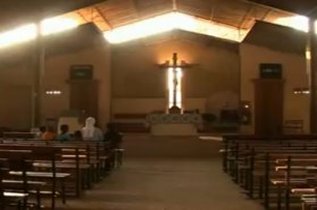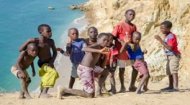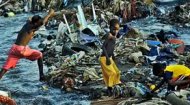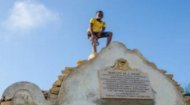|
Angola Child Witches
Nearly thirty years of civil war left many, but not all, in Angola in a poverty crisis, and such poverty means many families simply cannot afford to raise their children. In Angola it is considered unacceptable to abandon a child because of such poverty, but if the children are possessed by the devil, well, that's a different matter. Angola is one of a handful of countries where allegations of child witchcraft are on the rise along with Benin, Cameroon, Central African Republic (CAR), Democratic Republic of Congo (DRC) and Nigeria. Children accused of being witches have been crippled, tied up, burnt and left to die. It would be easy to assume that such such practises go back generations however the phenomena, if it can be called that, is of fairly recent origin, within the last 20-40 years and has been undoubtedly fuelled by the proliferation of so called churches who offer their services, at a cost, to exorcise a child.
|
|
In Angola the phenomenon became most noted towards the end of the 1990s when an unusually high number of children were seen living on the streets, particularly in northern Angola, having been thrown out by their parents. On investigation it became apparent that most of these children had been accused of witchcraft and this sharp rise in numbers reflected the number of smaller and Pentecostal churches often led by Bakongo and Congolese pastors that had set up alongside traditional churches such as Catholic, Baptist, Tocsoista, and Kimbanguista in the region.  A United States Agency for International Development report stated "In today's circumstances, self-made preachers can easily set up their pulpits and mete out predictions for those seeking an easy fix for their grief and misfortune. When prophecies fail, the preachers might easily blame continued misery on spurious causes, such as witchcraft, often turning on children as the source because they are easy to blame and least able to defend themselves. A United States Agency for International Development report stated "In today's circumstances, self-made preachers can easily set up their pulpits and mete out predictions for those seeking an easy fix for their grief and misfortune. When prophecies fail, the preachers might easily blame continued misery on spurious causes, such as witchcraft, often turning on children as the source because they are easy to blame and least able to defend themselves.
A family seeking the advice of their preacher might, for example, be told that their handicapped child is causing their continued misery, citing the child's disability as a clear indication that he or she is a witch." The answer, according to these pastors was an exorcism. Such exorcisms are brutal in nature and have been known to include starving the child, beating them into confession and pouring petrol into them as well as other harmful substances. Such exorcisms made good money for the pastors charging around 25UK for each exorcism successful or not; this on top of an earlier fee for investigating the possibility the child is a witch. It is in their interests to detect signs of witchcraft in the children, which often preys upon an already established belief by the family or community that the child has brought hardship and loss in the family. As for the risk, as one pastor retorted dismissively "Why should the child die? If the child dies, it means the child is evil." Cont/... |
|
| |

 A United States Agency for International Development report stated "In today's circumstances, self-made preachers can easily set up their pulpits and mete out predictions for those seeking an easy fix for their grief and misfortune. When prophecies fail, the preachers might easily blame continued misery on spurious causes, such as witchcraft, often turning on children as the source because they are easy to blame and least able to defend themselves.
A United States Agency for International Development report stated "In today's circumstances, self-made preachers can easily set up their pulpits and mete out predictions for those seeking an easy fix for their grief and misfortune. When prophecies fail, the preachers might easily blame continued misery on spurious causes, such as witchcraft, often turning on children as the source because they are easy to blame and least able to defend themselves.






